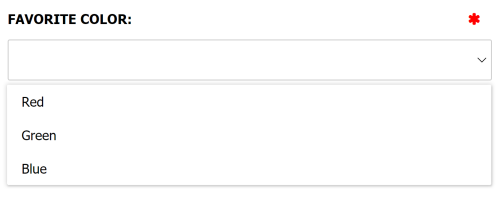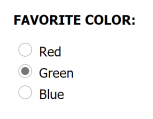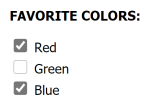There are three data annotations for rendering list-style elements:
[SelectList]: A drop-down list of options.[RadioList]: A list of radio buttons that allows only a single option to be selected.[CheckboxList]: A list of checkbox options that allows multiple options to be selected.
Options can be provided in three different ways:
Enum: Use an enum type to derive the options from enum values.IListOptionSource: Define a class that generates option values at runtime.IListOptionApiSource: Define a class that tells Cofoundry how to extract options from an API or static file.
Each of these are explained below:
List-style Annotations
[SelectList]

The [SelectList] data annotation can be used to decorate a collection attribute to indicate it should be rendered as a select list (drop down list) in the admin UI.
The property should use the same type as the associated option values. For value types, a nullable type can be used to indicate the field is optional. For reference types like string the field will be optional by default, but you can use the [required] attribute to force a value to be selected.
An "option source type should be provided in the constructor, this is used to determine the options available for the property. See Option Sources for more details.
Optional parameters
- DefaultItemText: The text to display when the value is not set or has not been selected yet.
Example
This example uses an Enum option source:
using Cofoundry.Domain;
public enum ColorOption
{
Red,
Green,
Blue
}
public class ExampleDataModel : ICustomEntityDataModel
{
[SelectList(typeof(ColorOption))]
public ColorOption FavoriteColor { get; set; }
}
[RadioList]

The [RadioList] data annotation can be used to decorate a collection attribute to indicate it should be rendered as a list of radio buttons in the admin UI.
The property should use the same type as the associated option values. For value types, a nullable type can be used to indicate the field is optional. For reference types like string the field will be optional by default, but you can use the [required] attribute to force a value to be selected.
An option source type should be provided in the constructor, this is used to determine the options available for the property. See Option Sources for more details.
Optional parameters
- DefaultItemText: The text to display when the value is not set or has not been selected yet.
Example
This example uses an Enum option source:
using Cofoundry.Domain;
public enum ColorOption
{
Red,
Green,
Blue
}
public class ExampleDataModel : ICustomEntityDataModel
{
[RadioList(typeof(ColorOption))]
public ColorOption FavoriteColor { get; set; }
}
[CheckboxList]

The [CheckboxList] data annotation can be used to decorate a collection attribute to indicate it should be rendered as a list of checkboxes in the admin UI.
A checkbox list allows multiple values to be selected and so the property type should be a collection, and the collection type should use the same type as the associated option values.
The [Required] attribute can be used to ensure that at least one item is selected in the list.
An option source type should be provided in the constructor, this is used to determine the options available for the property. See Option Sources for more details.
Optional parameters
- NoValueText: The text to show in non-edit mode when no value is selected.
Example
This example uses an Enum option source:
using Cofoundry.Domain;
using System.Collections.Generic;
public enum ColorOption
{
Red,
Green,
Blue
}
public class ExampleDataModel : ICustomEntityDataModel
{
[CheckboxList(typeof(ColorOption))]
public ICollection<ColorOption> FavoriteColors { get; set; }
}
List Option Sources
Enum
The simplest way to define a list of values is to use an Enum type. The names of the enum values will be used in the list, presented in the order that they are defined.
Each enum name is converted to sentence case before rendering e.g. "ExampleValue" becomes "Example value".
Each of the examples in the previous section uses an Enum source.
IListOptionSource
Use an IListOptionSource to define ta static list of option, text and values you want in your selection list.
Simply implement the interface and pass the type into the list attribute constructor.
Note that your IListOptionSource does not support DI.
Example
using Cofoundry.Domain;
using System.Collections.Generic;
public class ExampleListOptionSource : IListOptionSource
{
public ICollection<ListOption> Create()
{
var options = new List<ListOption>();
options.Add(new ListOption("Negative", 1));
options.Add(new ListOption("Neutral", 2));
options.Add(new ListOption("Positive", 3));
return options;
}
}
public class ExampleDataModel : ICustomEntityDataModel
{
[RadioList(typeof(ExampleListOptionSource), DefaultItemText = "Not Specified")]
public int? Feedback { get; set; }
}
IListOptionApiSource
Using an API source gives you the flexibility of generating your list options from a dynamic data source such as a database.
Creating an API
You'll first need to create your API endpoint. The response will need to conform the following constraints:
- The data should an array of models.
Objectis used in the example below for simplicity. - The data can be at the root of the JSON document, or can be nested in a
dataproperty (lower case).
In the example below we inherit from BaseAdminApiController to ensure that the API is only permitted to be accessed by users logged into the Cofoundry admin panel.
using Microsoft.AspNetCore.Mvc;
using Cofoundry.Web.Admin;
[Route("admin/api/pets")]
[ApiController]
public class PetsApiController : BaseAdminApiController
{
public ActionResult<object[]> Get()
{
var result = new object[]
{
new { Id = 1, Title = "Dog" },
new { Id = 2, Title = "Cat" },
new { Id = 3, Title = "Fish" },
new { Id = 4, Title = "Stick Insect" }
};
return result;
}
}
This example API returns this response:
[
{
"id": 1,
"title": "Dog"
},
{
"id": 2,
"title": "Cat"
},
{
"id": 3,
"title": "Fish"
},
{
"id": 4,
"title": "Stick Insect"
}
]
Linking your API using IListOptionApiSource
Inherit from IListOptionApiSource to describe your API by implementing these properties:
- Path: The path the to the list option API. This should be relative e.g. /admin/api/example-options
- NameField: The field in the response object to display in the option.
- ValueField: The field in the response object to use as the option value.
Example
using Cofoundry.Domain;
using System.Collections.Generic;
public class PetsApiOptionSource : IListOptionApiSource
{
public string Path => "/admin/api/pets";
public string NameField => "Title";
public string ValueField => "Id";
}
public class ExampleDataModel : ICustomEntityDataModel
{
[CheckboxList(typeof(PetsApiOptionSource))]
public ICollection<int> PetIds { get; set; }
}